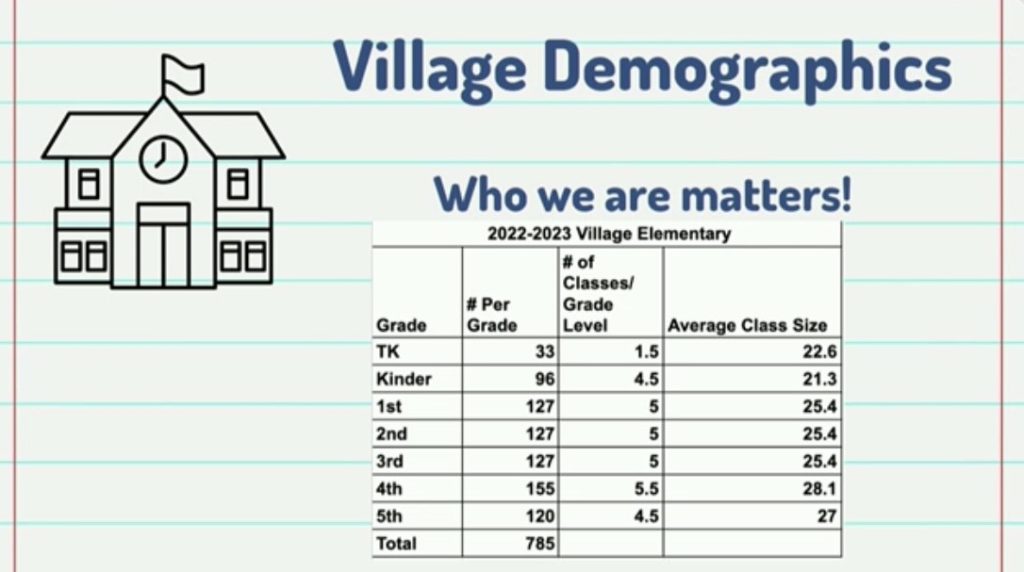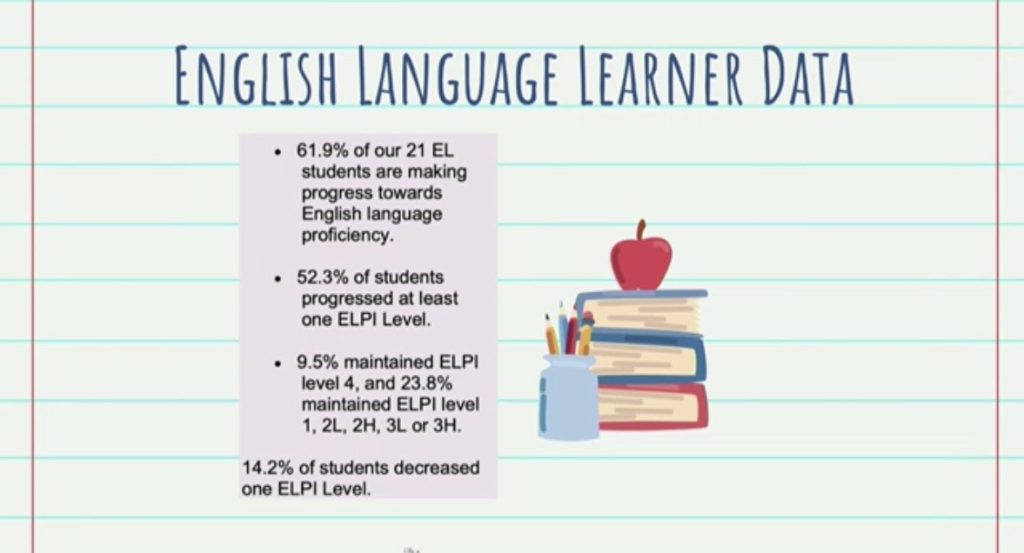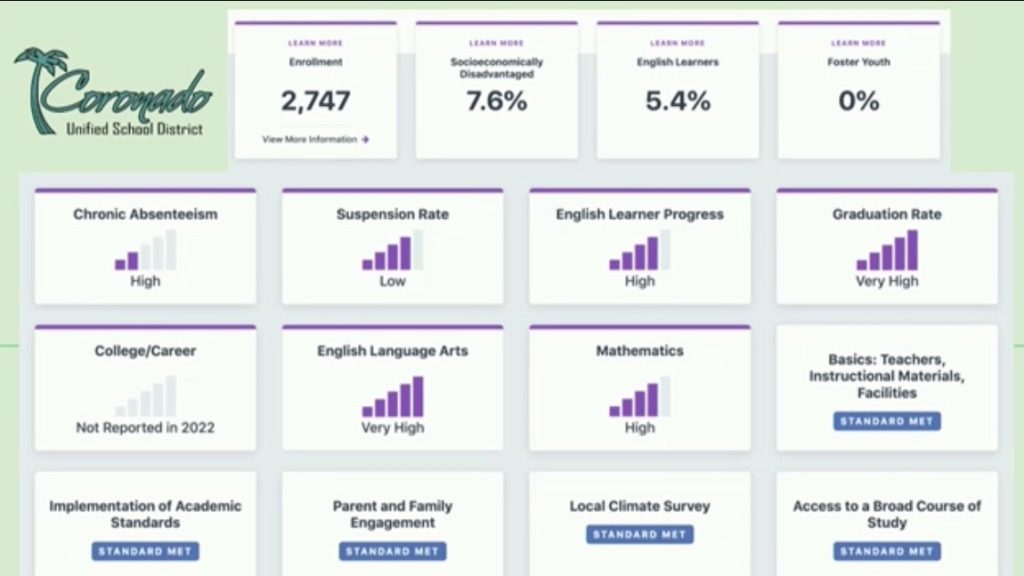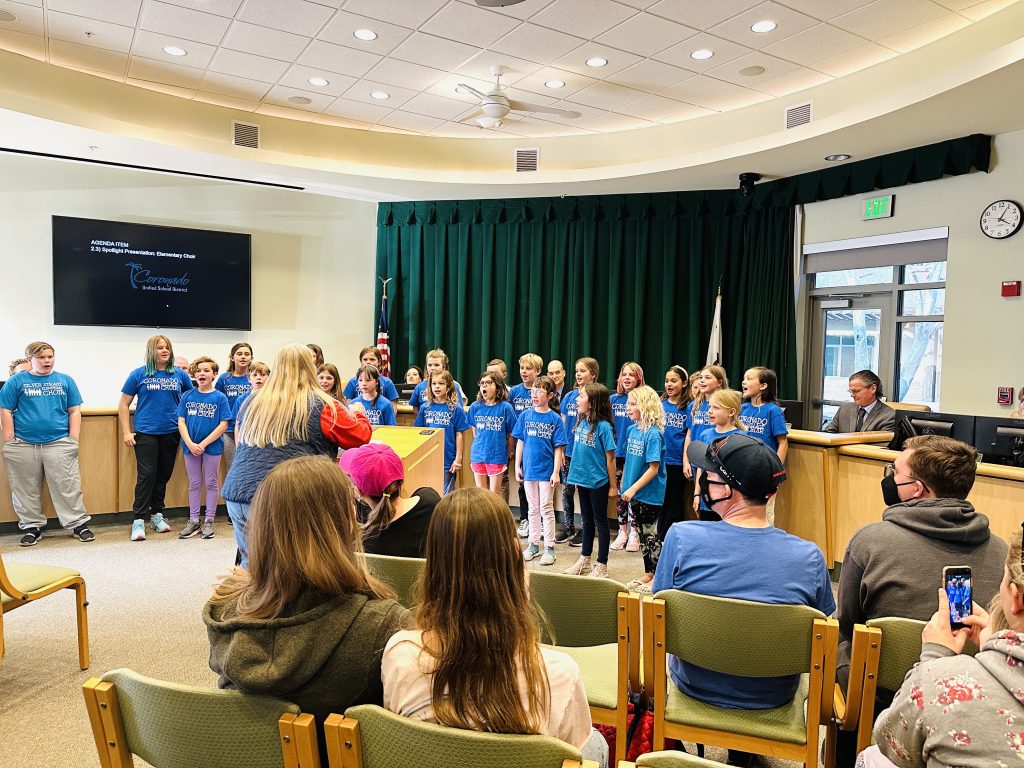The Coronado Unified School District trustees met on Thursday, February 16 at District Offices where board members updated the community on the 4×4 committee progress and community members shared concerns regarding the district’s participation in equity conferences.
Coronado residents Ann Sonne and Carolyn Rogerson questioned why 25 school staff and administrators were sent to a board-approved January equity conference at a cost of $11,500.
“When you send someone to a math conference, the teachers come back with math information they share in the classrooms,” said Sonne. “But when you send someone to an equity workshop, I have no idea about what they are bringing back to the classroom. I think that’s what the community is baffled about.”
Carolyn Rogerson shared concerns about the district’s expenditure of taxpayer money, and asked exactly what teachers and staff learned at the equity conference.
“Are kids being asked in front of everyone, what are your pronouns?” asked Rogerson. “Are you keeping secrets from parents? These are important things that we need to know.”
Earlier in the week, the district sent out a news release (see below) describing CUSD’s role in attending the conference, which included information from educators who work with different subgroups, including English learners and special education.
In an email after the meeting, Superintendent Karl Mueller shared that such conferences are directly related to academic achievement of all CUSD learners. He said that CUSD students have different backgrounds, abilities, and challenges. In order to attain academic achievement for all students, the district must differentiate instruction, services, and resource distribution to respond effectively to the diverse needs of their students.
“We have students that need more interventions to be successful,” said Mueller. “If we want to get their test scores up, we need to provide them with additional support and resources in our subgroups.”
Mueller said that it’s important to remember, equity is about providing all students with what they need to be included at school: to access the curriculum, and to meet academic objectives and standards. This does not mean compromising the academic objectives and standards for others.
“It’s about meeting the learner where they are at, and providing them with resources they need to access the curriculum and demonstrate mastery and comprehension of the subject matter,” said Mueller. “And in no way does that compromise the standard or water it down, or take away from the other students in the classroom.”
Community members can visit this link to learn more about how CUSD defines equity on the district’s website, and see how it impacts learning in the classroom.
A second equity-related expenditure, the upcoming $20,000 Educational Equity & Excellence Audit by San Diego State University Research Foundation, was also called into question. Trustee Scott Youngblood defended the board-approved audit, with a caveat.
“I think that if there’s a chance that they can help [improve educational practices] with any students or subgroups, and improve their academic achievement, then I think it’s a worthy undertaking,” said Youngblood. “However, I think we need to be vigilant about what this might contain.”
Youngblood said that he finds the word “equity” to be controversial, and later in the meeting asked for a clearer definition of what educational equity meant to CUSD.
“Equity is defined on our website,” said Trustee Alexia Palacios-Peters. “That’s the definition that we use here at CUSD. So I don’t have any concerns about it. But we’ll see what the [audit] says.”
Earlier in the meeting, Palacios-Peters shared information about the 4×4 subcommittee, which was directed to gather stakeholder data to make any needed improvements in the block scheduling, which is in its second year.
“The purpose is to perform a comprehensive evaluation of the new 4×4 bell schedule by all stakeholders within the CHS community, and to fully assess its impact on student achievement and opportunity for academic growth with an aim towards identifying strengths, weaknesses and areas for improvement, if any,” said Palacios-Peters. “That’s its mission and focus.”
She said that she, along with Trustee Youngblood, have overseen two meetings with committee members. Palacios-Peters said that the committee unanimously decided to hold closed meetings to protect the privacy of stakeholders with whom they speak and gather meaningful data. The committee will open some meetings to the public, which will be posted online.
This didn’t sit well with some members of the community, who wanted all meetings to be open to the public. Coronado resident Ann Sonne said that the committee had “gone rogue” and could be in danger of reflecting personal agendas instead of valuable community input.
“Why the secrecy?” said Sonne. “It makes us think you have something to hide. Trust in these committee meetings have already been compromised.”
Palacios-Peters said the committee is meeting weekly, and that they hope to push out a report by the May 2023 board meeting. In the meantime, community members are encouraged to reach out to herself or Youngblood with questions and comments.
“The 4×4 committee will play a crucial role in getting all the stakeholder input,” said Youngblood. “I encourage everyone who has opinions and input to participate as much as possible when the time arises.”
Village Elementary School Principal Dr. Heidi Bergener was at the meeting to share her annual report. She shared test scores and demographic information, noting the 21% Hispanic population, 12% military and 10% special education. When it comes to the English Language Learner subgroup, she shared that more than 60% of the students are making progress towards English language proficiency. Bergener also highlighted the new world language program which delivers Spanish language instruction to the classroom.
“We have Spanish every week,” said Bergener. “Our kids are thriving and our children love it.”

 Bergener said that Village is hyper-focusing on third grade literacy, and making sure they meet or exceed that benchmark. She also explained some of the Social Emotional Learning goals, which she described as setting the norms for engagement on a daily basis.
Bergener said that Village is hyper-focusing on third grade literacy, and making sure they meet or exceed that benchmark. She also explained some of the Social Emotional Learning goals, which she described as setting the norms for engagement on a daily basis.
“It’s about how I treat someone, my empathy, my compassion, and getting to know that other person,” said Bergener. “It’s reducing the opportunity for me not to know you.”
Bergener said that Village has “reasonably decent” class sizes, but she would love for them to be smaller. She also said that moving kindergarten to the Village campus has been a win overall.
“It’s been wonderful to have the staff on one campus; that is an absolute strength,” said Bergener. “Yes, we would love some more space, but the benefits outweigh those challenges, in my opinion.”
Also in reports, Dr. Megan Battle, the CUSD Director of Learning, shared the new and revised 2022 California State Dashboard, highlighting the academics that ranked very high, but also the higher levels of chronic absenteeism. She said that this year’s absentee numbers, compared to last year’s, are trending lower. She also noted the very high rate for graduation and the low suspension rate.
 When it comes to the Superintendent’s Long Range Plan, he shared that the school safety report is moving along quickly. Mueller said that the district had already received their plan review report from the emergency operations group, and that the district will be reviewing those with the Coronado Police Department as they conduct their site visits March 6-8.
When it comes to the Superintendent’s Long Range Plan, he shared that the school safety report is moving along quickly. Mueller said that the district had already received their plan review report from the emergency operations group, and that the district will be reviewing those with the Coronado Police Department as they conduct their site visits March 6-8.
Association of Coronado Teachers president Jennifer Landry shared information about new teacher hires, as well as the continued district-wide lack of instructional aids. She said that it’s really affecting how classrooms operate and how teachers can teach “in a way that it never has before.”
“When aids were more consistent, students were ready to learn and to be successful. But now, when an instructional aid does show up, it’s often a different one than they’ve had before, and they have to be debriefed,” said Landry. “Often, the students feel vulnerable and aren’t ready to learn.”
She addressed the community, and encouraged residents to consider coming to work as an instructional aid. She said CUSD is a “great place to work,” and asked residents to “come on down.”
Also in reports, Luke Johnson, Associated Student Body President, shared information about the recent College and Career Fair at CHS which featured tables with more than 40 universities and career-based programs including all branches of the military, police and fire department.
In action items, the board approved a Cox bid for CUSD internet. According to Deputy District Superintendent Donnie Salamanca, not only does the district already use Cox, but it was the only service provider that was able to guarantee an effective date of July 1st to ensure preparation for the new school year.
The board also voted to nominate Trustee Whitney Antrim (who was not able to attend the meeting) as well as Rhea Stewart and Delia Dominguez Cervantes, from Cardiff and Chula Vista school districts, respectively, as delegates to the California School Boards Association. The board also decided to reword a letter drafted to the College Board, asking for more flexible AP testing options to accommodate students on the 4×4 schedule.
Earlier in the evening during Board and Superintendent comments, Board President Renee Cavanaugh shared that she attended former DEA agent Rocky Herron’s talk about teen drug use. She said it was a “powerful” and “sobering” and was looking forward for his return to CHS.
Mueller shared that all four CUSD school sites received the prestigious Purple Star Designation, which is a program that seeks to reduce the burden on military connected schools and their families. The program signals which schools are the most committed and most equipped to meet their needs, according to Mueller.
In his comments, Trustee Youngblood shared that California has decided not to require COVID vaccines for K-12 students.
“As a physician I think this is long overdue,” said Youngblood.
He said that, in regards to the vaccine, in spite of being promised to reduce transmission or infection, most public health officials have admitted that this “never really happened” and certainly “isn’t happening now.” He said that children with COVID-19 never really got infected to a significant degree, and didn’t transmit it to a significant degree. The latest COVID-19 information is available on the CDC website.
 Earlier in the evening, the CUSD Elementary choir performed two songs for the community, including “A Salute to our Presidents.” They also invited the community to attend the Band and Choir Annual Spaghetti Dinner at Granzer Hall at CMS on Friday, March 3.
Earlier in the evening, the CUSD Elementary choir performed two songs for the community, including “A Salute to our Presidents.” They also invited the community to attend the Band and Choir Annual Spaghetti Dinner at Granzer Hall at CMS on Friday, March 3.
Community Partner Safe Harbor gave a short presentation about their work with CUSD and the community at large. According to Georgia Ferrell, the organization facilitates low-cost counseling, youth and fostering programs and community education. It also organizes parent education and community outreach.
In regards to community partnerships, community member Brian Flick suggested that they may be used as a way to push a non-curriculum agenda that does not contribute to CUSD’s academic mission. He said that the district-wide ban on sales of plastic water bottles, in conjunction with the district’s Wellness Committee and Emerald Keepers partnership, was one such example.
“I’m concerned that community partnerships are being leveraged as a tool by the administration to push an agenda that has no place in public education,” said Flick. “Example: the plastic water bottle ban that was put in place for no other reason that I can surmise, other than it makes the superintendent feel good. It does not save the school money, it does not increase the academic performance of the students, and it does not address any problem that impacts the school.”
According to organizations that monitor the negative effects of plastic on the environment, disposable water bottle waste washes into the ocean and kills more than one million marine creatures each year. Scientists say that about 8 million metric tons of plastic enter the ocean each year, taking hundreds of years to decompose.
Earlier in the evening, the board approved the acceptance of donations to the district, including a $10,000 donation from Gwyn Bent for the Brian Bent Memorial Aquatics Center, as well as a $5,000 donation for the same cause. Jennifer Landry also donated a rolling charging station.
The next regularly scheduled board meeting is set for Thursday, March 9.




